The Lingashtakam Lyrics or Stotram is a deeply devotional Sanskrit hymn in praise of Lord Shiva’s Lingam—the symbolic representation of Shiva in Hindu temples and religious practices. Composed of eight verses, or ‘ashtakam’, this hymn extols the glory, power, and divine attributes of the Lingam, expressing the worshipper’s reverence, devotion, and adoration towards Lord Shiva.
Each verse of the Lingashtakam Lyrics begins with a vivid description of the Lingam, adorned with various sacred substances, worshipped by gods and sages, and is the source of cosmic energy and spiritual enlightenment.
The hymn highlights the Lingam’s significance in removing sins, alleviating worldly sufferings, and granting wishes, ultimately leading the devotee towards moksha (liberation from the cycle of birth and death).
The recurring refrain “Tat Pranamami Sadasiva Lingam” at the end of each verse translates to “I bow down to the eternal Shiva Lingam,” signifying the devotee’s surrender and dedication to Lord Shiva. The Lingashtakam is a part of the broader tradition of Shiva worship in Hinduism, embodying the essence of devotion and the pursuit of spiritual liberation.
Chanting or listening to the Lingashtakam Stotram is a common devotional practice, especially during the auspicious month of Shravan, on Maha Shivaratri, and other festivals dedicated to Lord Shiva. It is believed that regular recitation of the Lingashtakam brings spiritual benefits, peace, prosperity, and the divine grace of Lord Shiva to the devotee and their family.
Understanding The Powerful Shiva Lingashtakam
Chanting or listening to the Shiva Lingashtakam is considered one of the most effective methods to praise and please the supreme deity, Lord Shiva. The stotram is a prayer comprising 8 salutations or invocations, offered to the deity in his aspect as a Linga, which is the universal symbol of creation, and the source of everything.
This prayer glorifies the Shiva Linga, and its greatness in an elaborate form, with each aspect of the hymn listing the God’s glory, along with the benefits of worshipping the Shivalinga.
It goes on to state that the Linga is even worshipped by Brahma and Vishnu, alongside other gods and sages as well, being powerful enough to take away the pride of demons such as Ravana. Forever filled with peace and bliss, it destroys any and all suffering caused by the cycle of birth and rebirth.
Adorned with fragrances, and decorated with gold, precious stones, and shining gems, the Shivalinga grants intelligence, while burning the sexual desires of the devotees. It even caused the destruction of Daksha.
Covered by sandalwood paste and kumkum, and adorned with garlands, the Shiva Lingam has the power to destroy the past karmas of devotees. Whoever recites the Lingashtakam daily, feels the presence of Shiva on a regular basis, and will travel to his loka to live with him after death.
Lingashtakam Lyrics In Hindi – “ब्रह्ममुरारि सुरार्चित लिंगं”
The hymn is very pleasant to recite. Here is the complete prayer in simple Devanagari (Hindi).
ब्रह्ममुरारि सुरार्चित लिंगं
निर्मलभासित शोभित लिंगम् ।
जन्मज दुःख विनाशक लिंगं
तत्-प्रणमामि सदाशिव लिंगम् ॥ १ ॥
देवमुनि प्रवरार्चित लिंगं
कामदहन करुणाकर लिंगम् ।
रावण दर्प विनाशन लिंगं
तत्-प्रणमामि सदाशिव लिंगम् ॥ २ ॥
सर्व सुगंध सुलेपित लिंगं
बुद्धि विवर्धन कारण लिंगम् ।
सिद्ध सुरासुर वंदित लिंगं
तत्-प्रणमामि सदाशिव लिंगम् ॥ ३ ॥
कनक महामणि भूषित लिंगं
फणिपति वेष्टित शोभित लिंगम् ।
दक्ष सुयज्ञ निनाशन लिंगं
तत्-प्रणमामि सदाशिव लिंगम् ॥ ४ ॥
कुंकुम चंदन लेपित लिंगं
पंकज हार सुशोभित लिंगम् ।
संचित पाप विनाशन लिंगं
तत्-प्रणमामि सदाशिव लिंगम् ॥ ५ ॥
देवगणार्चित सेवित लिंगं
भावै-र्भक्तिभिरेव च लिंगम् ।
दिनकर कोटि प्रभाकर लिंगं
तत्-प्रणमामि सदाशिव लिंगम् ॥ ६ ॥
अष्टदलोपरिवेष्टित लिंगं
सर्वसमुद्भव कारण लिंगम् ।
अष्टदरिद्र विनाशन लिंगं
तत्-प्रणमामि सदाशिव लिंगम् ॥ ७ ॥
सुरगुरु सुरवर पूजित लिंगं
सुरवन पुष्प सदार्चित लिंगम् ।
परात्परं परमात्मक लिंगं
तत्-प्रणमामि सदाशिव लिंगम् ॥ ८
॥लिंगाष्टकमिदं पुण्यं यः पठेश्शिव सन्निधौ ।
शिवलोकमवाप्नोति शिवेन सह मोदते ॥
Lingashtakam Lyrics In English With Meaning
The Lingashtakam Stotram remains one of the most popular and widely chanted Shiva mantras, with Shaiva priests considering it to be very auspicious, particularly when chanting during Shivaratri nights and the month of Shravana. Below are the complete lyrics of Lingashtakam in English, with their meanings after each stanza.
Brahma Murari surarchita Lingam
Nirmala bhasita sobhita Lingam
Janmaja dukha vinasaka Lingam
Tat pranamami Sadasiva Lingam
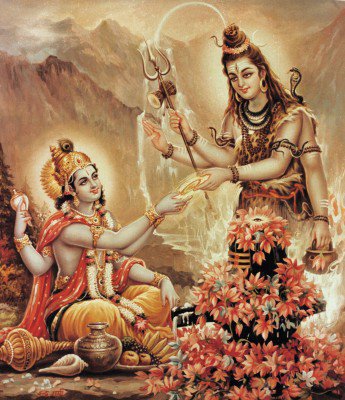
Brahma Murari Surarchita Lingam: The Lingam, the symbol of Lord Shiva is worshiped by Brahma, the creator, and Murari (Lord Vishnu) and all other Gods.
Nirmala Bhasita Sobhita Lingam: (‘Nirmala’ means pure, and ‘Bhasita’ can refer to sacred ash, which is an important aspect of Shaivism and Shiva’s own aesthetic). As a result, he is also ‘Sobhita’, or the one who shines, or is splendid.
Janmaja Dukha Vinasaka Lingam: this line says the Lingam is a destroyer of sorrows born of the cycle of birth and death. It gives ultimate peace to devotees who are stuck in an endless cycle of death and rebirth.
I bow down before the Lingam, which is the eternal form of Lord Shiva, that is worshipped by Brahma, Vishnu and other Gods, which is pure and resplendent, and which destroys sorrows of birth.
Devamuni pravararchita Lingam
Kamadahana karunakara Lingam
Ravana darpa vinasaka Lingam
Tat pranamami Sadasiva Lingam
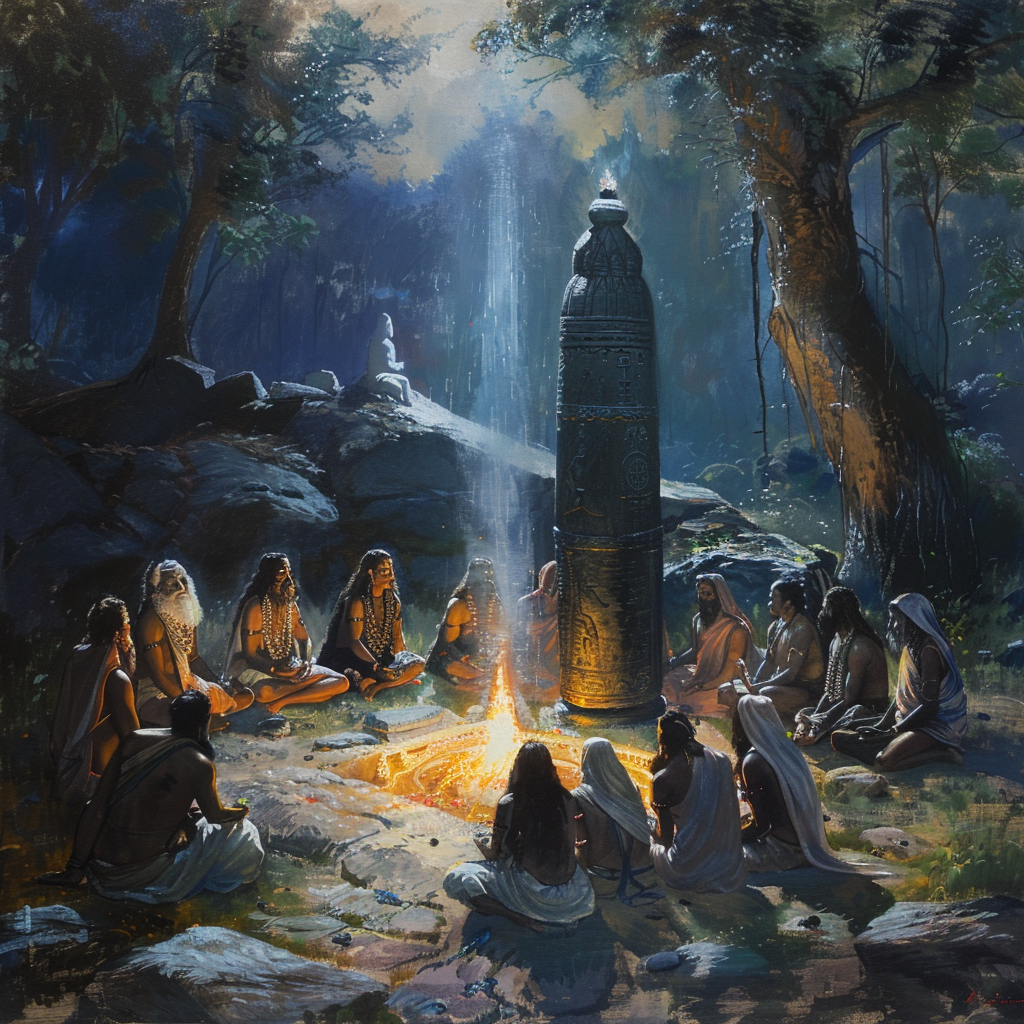
Devamuni Pravararchita Lingam: Lingam is worshipped by the foremost among gods and sages, highlighting the Lingam’s significance across the heavens and the earth.
Kamadahana Karunakara Lingam: Worshiping the Lingam destroys the bonds of desire that entangle human souls, and thus them towards spiritual liberation.
It is also described as ‘Karunakara’, or the embodiment of compassion, indicating that Shiva, through the Lingam, offers the grace and compassion necessary for devotees to overcome their attachments and sufferings.
Ravana Darpa Vinasaka Lingam: It symbolizes the Lingam’s ability to break down even the strongest arrogance, teaching the importance of humility and the destructive nature of unchecked ego on the spiritual path.
I offer my salutations to the Lingam, which is the form of eternal Shiva, that is worshipped by great saints and Gods, which destroys the god of love, that showers mercy, and which destroyed the pride of Ravana.
Sarva sugandhi sulepita Lingam
Buddhi vivardhana karana Lingam
Siddha surasura vandita Lingam
Tat pranamami Sadasiva Lingam
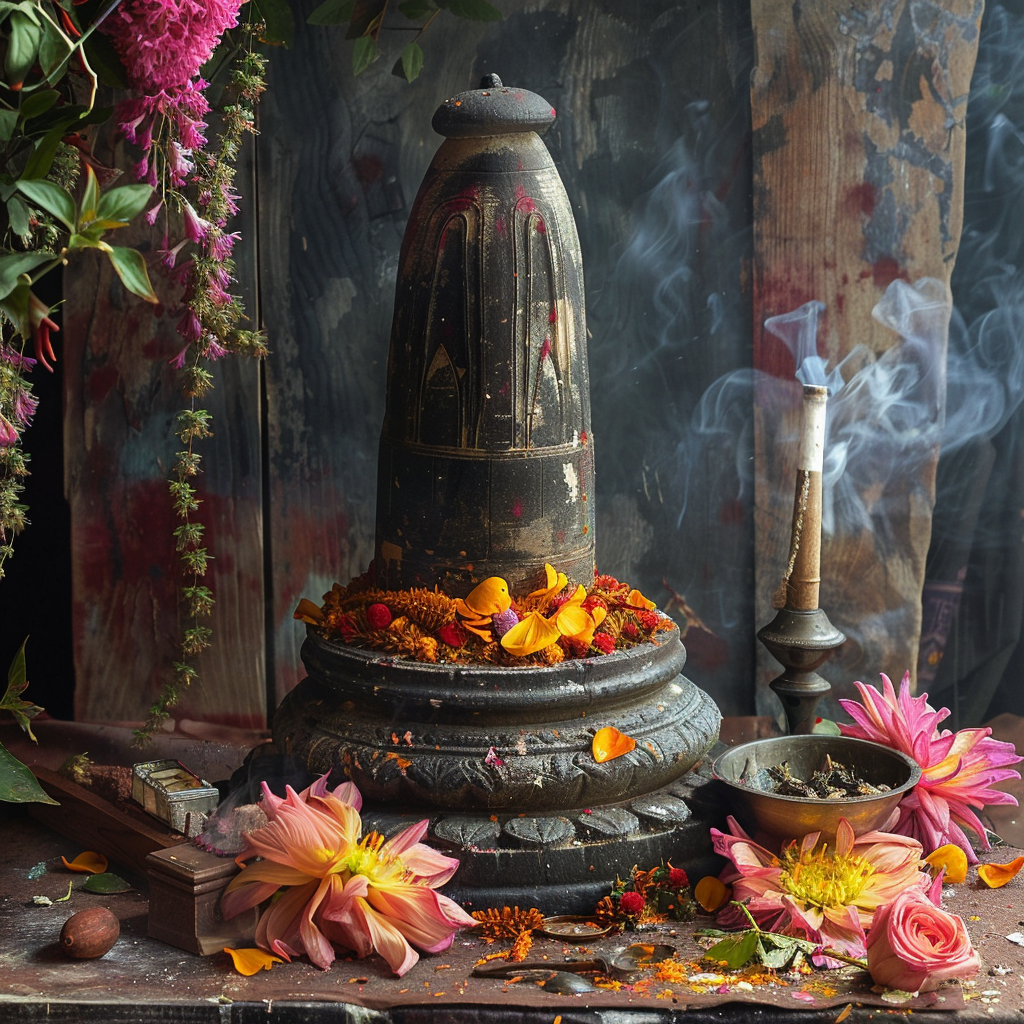
Sarva Sugandhi Sulepita Lingam: Lingam is smeared (‘sulepita’) with all kinds of fragrances (‘sarva sugandhi’). This symbolizes the purification of the mind and senses and with devotees’ intentions to spread pleasantness and positivity.
Buddhi Vivardhana Karana Lingam: Here, the Lingam is lauded as the cause (‘karana’) for the increase (‘vivardhana’) of intelligence (‘buddhi’). Worshiping the Lingam can enhance one’s intellect and wisdom, fostering spiritual growth and understanding.
Siddha Surasura Vandita Lingam: Lingam is worshiped (‘vandita’) by both the siddhas (accomplished ones or saints) and ‘surasura’ (gods and demons alike). This universal worship signifies the Lingam’s supreme sanctity, transcending dualities and attracting reverence from all beings, regardless of their nature.
I bow down to the Lingam, which is eternal Shiva, that is adorned by fragrances, which leads to increasing wisdom, and that is worshipped by devas, sages, and demons.
Kanaka maha mani bhushita Lingam
Paniphati veshtitha shobhita Lingam
Dakshasu yajna vinashana Lingam
Tat pranamami Sadasiva Lingam
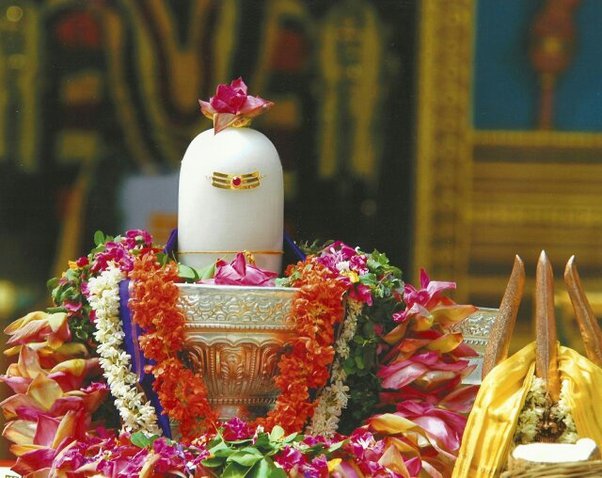
Kanaka MahaMmani Bhushita Lingam: This line describes the Lingam as adorned with gold and precious gems (‘kanaka’ means gold, and ‘maha mani’ means great gems). This imagery not only signifies material richness but also the spiritual wealth and illumination the Lingam brings to the devotees’ lives.
Paniphati Veshtitha Shobhita Lingam: Here, the Lingam is said to be surrounded by worshippers, who are likely offering prayers and performing rituals (‘paniphati’ refers to the hands folded in worship or prayer). This line emphasizes the Lingam’s role as a focal point of devotion and spiritual activity.
Dakshasu Yajna Vinashana Lingam: This act symbolizes the Lingam’s power to disrupt arrogance and ignorance, showcasing Shiva’s disdain for ego-driven rituals and his ability to restore cosmic balance. It’s a reminder of the Lingam’s capability to challenge and dismantle pride and falsehood.
I pray to the Lingam, which is the eternal Shiva, the one that is ornamented by great jewels and gold, which shines in the company of snake, and which destroyed the Yagna of Daksha.
Kumkuma chandana lepita Lingam
Pankaja hara sushosbhita Lingam
Sanchita papa vinashana Lingam
Tat pranamami Sadasiva Lingam
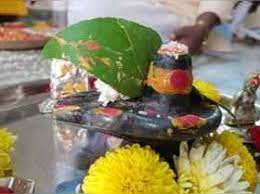
Kumkuma Chandana Lepita Lingam: Lingam being applied with kumkum (a red powder used in worship) and chandana (sandalwood paste), both of which are sacred materials in Hindu rituals.
Pankaja Hara Sushosbhita Lingam: Here, the Lingam is adorned with garlands made of lotus flowers (‘pankaja’ refers to the lotus). The lotus is a symbol of beauty, spirituality, and purity, emerging untainted from muddy waters.
Sanchita Papa Vinashana Lingam: This phrase emphasizes the Lingam’s power to destroy accumulated sins (‘sanchita papa’). It suggests that worship of the Lingam can lead to the purification of the devotee’s karma, freeing them from the cycle of sins and rebirths.
I bow down before that Lingam, which is the eternal Shiva, that is adorned by saffron and sandal paste, the one that wears the garland of lotus flowers, that destroys accumulated sins.
Devaganarchita sevita Lingam
Bhavair bhaktibhi revacha Lingam
Dinakarakoti prabhakara Lingam
Tat pranamami Sadasiva Lingam
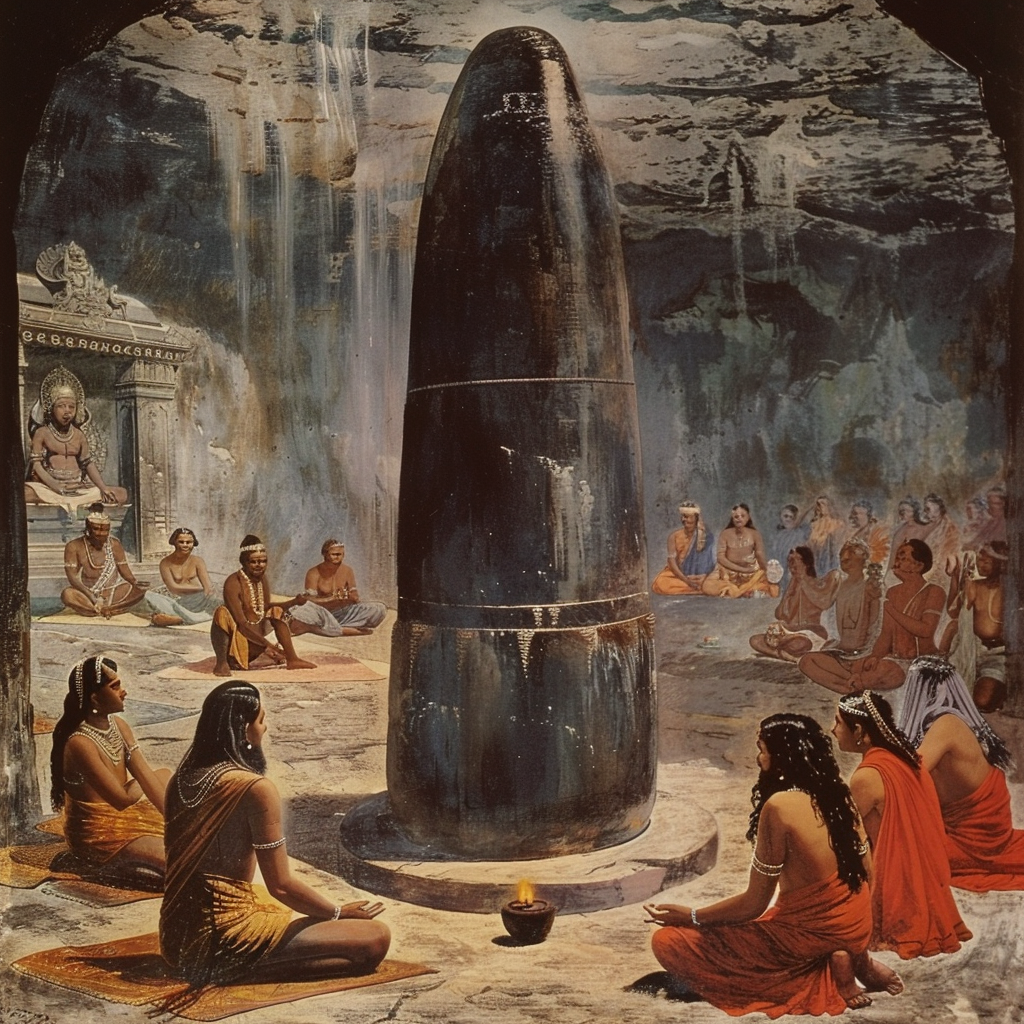
Devaganarchita Sevita Lingam: Lingam is worshipped and served by the assemblies of gods (‘Devagan’). The term ‘archita’ refers to worship, and ‘sevita’ to being served, indicating that the Lingam is not just an object of passive adoration but actively engaged in by divine entities.
Bhavair Bhaktibhi Revacha Lingam: Lingam is revered with feelings (‘Bhavair’) of devotion (‘bhaktibhi’) by its worshippers. This line emphasizes the emotional and spiritual connection between the devotees and the Lingam, suggesting that worship of the Lingam transcends mere ritual, involving deep, heartfelt devotion. The use of ‘revacha’ reinforces the idea of worship being performed with passion and sincerity.
Dinakarakoti Prabhakara Lingam: Lingam as shining with the brilliance of ten million suns (‘Dinakara’ refers to the sun, and ‘koti’ to ten million). It speaks to the indescribable luminosity and power of the Lingam, symbolizing its ability to illuminate the spiritual darkness and guide devotees on their path to enlightenment.
I offer my salutations to the Lingam which is the eternal form of Shiva, that is revered by gods and beings, the doorway of good thoughts and devotion, which shines like a billion suns.
Ashtadalo pariveshtia Lingam
Sarva samudbhava karana Lingam
Ashtadaridra vinashana Lingam
Tatpranamami Sadashiva Lingam
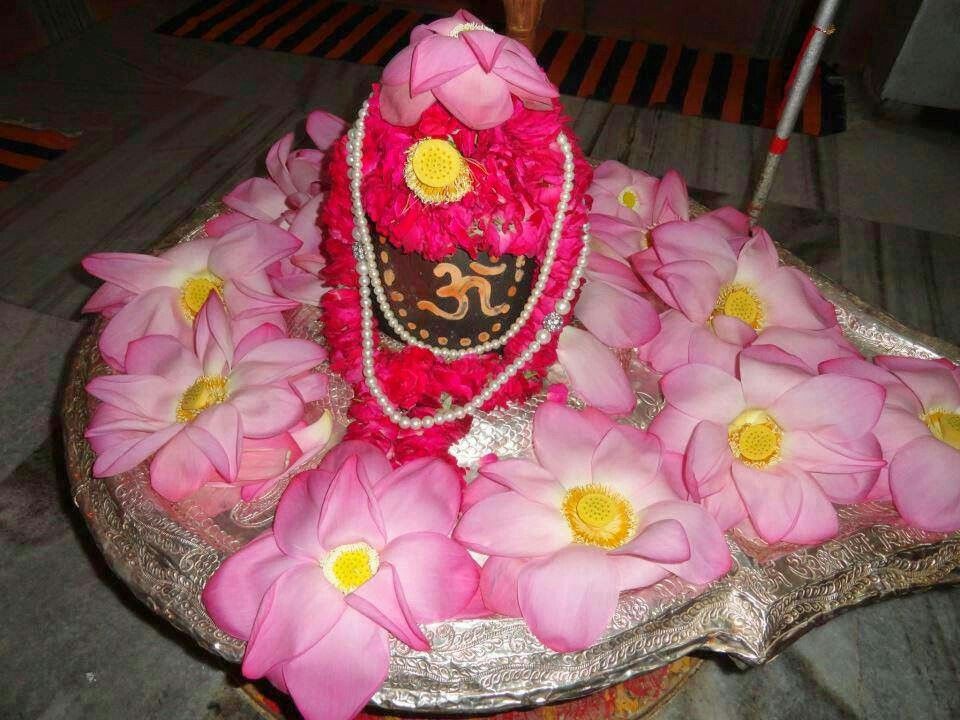
Ashtadalo Pariveshtia Lingam: Lingam being surrounded by an eight-petaled lotus (‘Ashtadalo’ means eight-petaled, and ‘pariveshtia’ means surrounded). Lingam is at the center of spiritual awakening and the unfolding of inner divine potential.
Sarva Samudbhava Karana Lingam: Here, the Lingam is hailed as the cause of all creation (‘Sarva samudbhava karana’). This phrase underscores the Lingam’s fundamental role in the cosmos, embodying the creative force from which all existence emerges.
It highlights the Lingam’s connection to Shiva as the supreme creator, preserver, and destroyer, whose divine play brings forth the universe.
Ashtadaridra Vinashana Lingam: Lingam has the power to destroy eight types of poverty (‘Ashtadaridra’), in various forms of suffering in human life, such as financial hardship, ill health, ignorance, and separation from the divine. Worshiping the Lingam, therefore, is seen as a path to overcoming these obstacles, leading to a life of abundance, wisdom, and spiritual fulfillment.
I bow down before that Lingam, the form of eternal Shiva, surrounded by eight petals, the prime cause of all riches, the one that destroys eight types of poverty.
Suraguru suravara pujita Lingam
Suravana pushpa sadarchita Lingam
Paratparam paramatmaka Lingam
Tatpranamami Sadashiva Lingam
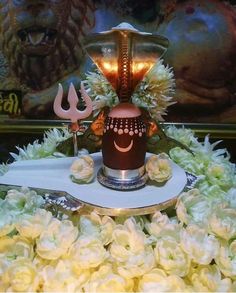
Suraguru Suravara Pujita Lingam: Lingam is worshipped (‘pujita’) by the ‘Suraguru’ (the teacher of the gods, often identified with Brihaspati) and the ‘suravara’ (the best or chief among the gods). Lingam’s exalted status in the celestial hierarchy is revered not just by ordinary deities but by the most eminent ones and their spiritual mentor, highlighting its divine significance.
Suravana Pushpa Sadarchita Lingam: Here, it’s mentioned that the Lingam is worshipped with ‘Suravana Pushpa’, which means flowers of the gods, denoting sacred and divine flowers. ‘Sadarchita’ emphasizes the continuous and respectful worship of the Lingam.
Paratparam Paramatmaka Lingam: This profound phrase describes the Lingam as ‘Paratparam’ (beyond the highest) and ‘Paramatmaka’ (the supreme soul). It speaks to the Lingam’s transcendental nature, embodying the ultimate reality and the essence of the cosmos.
I offer my salutations to the Lingam which is the eternal Shiva, that is worshipped by the teacher of all Lords, Which is worshipped by the best Gods, that is always worshipped by flowers, from the garden of Gods, the eternal abode, and the ultimate truth.
Lingashtakamidam punyam
Yat Pathet Shivasannidhau
Shivalokamavapnoti
Shivena saha modate.
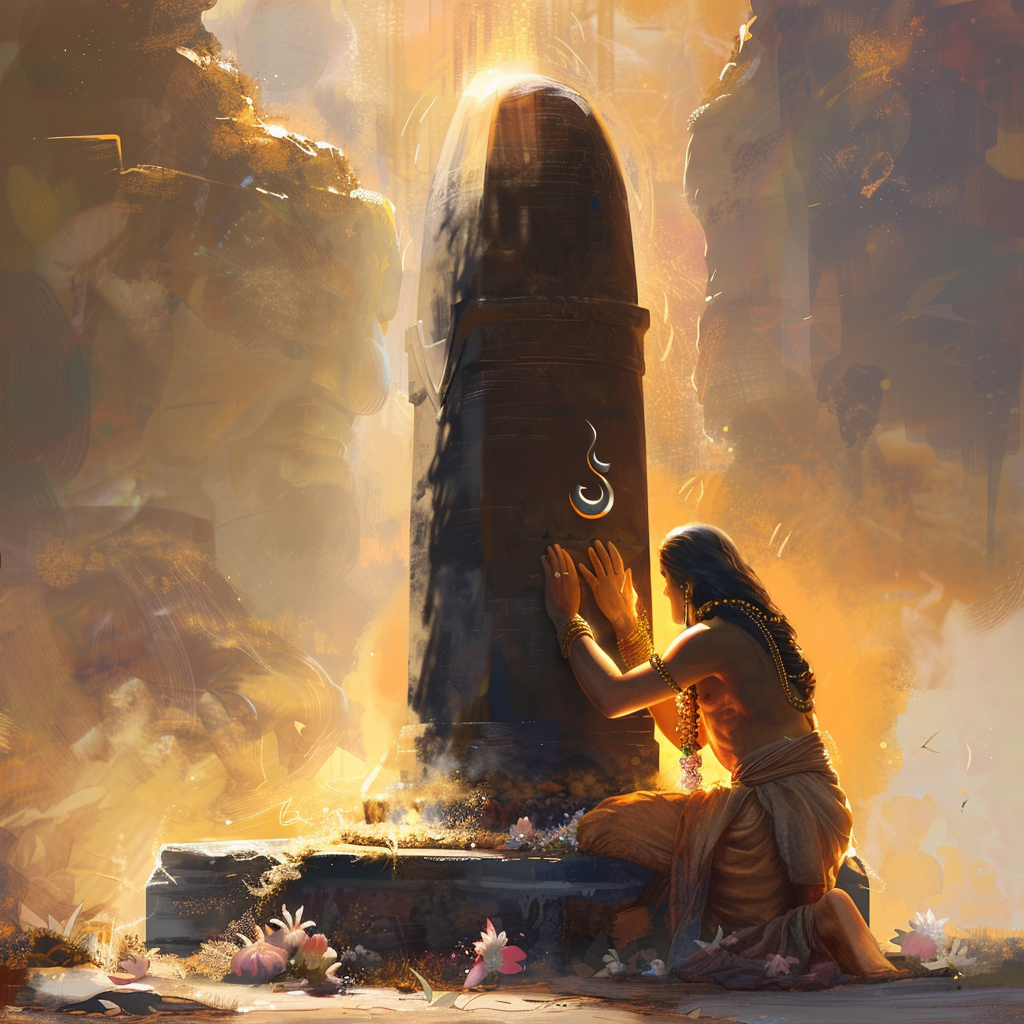
Lingashtakamidam Punyam: This phrase states that this Lingashtakam (the eight-verse hymn dedicated to the Lingam) is ‘punyam’, meaning it is holy, meritorious, and purifying.
Yat Pathet Shivasannidhau: Whoever recites (‘Pathet’) this Lingashtakam in the presence of Shiva (‘Shivasannidhau’)—which could mean either in a temple near the Lingam or in a space where one feels the presence of Shiva—engages in a deeply sacred act. It suggests a closeness to Shiva during the recitation, enhancing the spiritual experience and the efficacy of the prayers.
Shivalokamavapnoti: Here, it is promised that by doing so, the devotee attains ‘Shivalokam’, the abode of Lord Shiva. ‘Avapnoti’ means to obtain or achieve, symbolizing liberation from the cycle of birth and death (samsara) and the attainment of moksha (liberation).
Shivena Saha Modate: The hymn concludes with the assurance that the devotee will revel (‘modate’) with Shiva (‘Shivena saha’), indicating not just liberation but eternal bliss and fellowship with the deity.
Anyone who recites this holy octet of the Lingashtakam lyrics, In the holy presence of Lord Shiva, Will reach his world in the end and stay in his company.
Lingashtakam Stotram Chanting Benefits
Reciting the Lingashtakam Stotram lyrics, a deeply reverential hymn dedicated to Lord Shiva’s Lingam, is considered to have spiritual, emotional, and sometimes even physical benefits, according to Hindu beliefs. Here’s a rundown of some key benefits attributed to its regular recitation:
Achievement of Desires: It is believed that sincere recitation of the Lingashtakam can lead to the fulfillment of one’s desires. By pleasing Lord Shiva, devotees hope to receive his favor in achieving their goals and aspirations.
Enhancement of Concentration and Mental Peace: Regular chanting of the Lingashtakam can improve concentration, calm the mind, and reduce stress and anxiety. The vibrations created by chanting are considered to have a soothing effect on the mind and body.
Relief from Worldly Sorrows: Reciting Lingashtakam Lyrics promises relief from worldly sorrows and hardships. By invoking Lord Shiva’s name and qualities, devotees seek strength to overcome challenges and obstacles in life.
Attainment of Divine Blessings: Reciting the hymn with devotion is believed to attract the blessings of Lord Shiva, ensuring protection from evils and guidance on the path to righteousness. It’s thought to bring the devotee closer to the divine, experiencing Shiva’s infinite grace.
Purification of the Soul: The hymn is said to purify the soul, helping to remove sins and accumulated negative karma. This purification process is crucial for attaining moksha (liberation from the cycle of birth and death).
Access to Spiritual Knowledge: Through the regular chanting of Lingashtakam lyrics, a devotee may gain deeper insights into the nature of the divine and the universe. It encourages a reflective and meditative mindset, opening the door to spiritual wisdom.
Spiritual Growth: The Lingashtakam Stotram is believed to foster spiritual growth by deepening the devotee’s connection to Lord Shiva. It aids in cultivating qualities such as detachment, humility, and devotion, which are essential for spiritual advancement.
Universal Peace and Harmony: The hymn not only benefits the individual reciting it but is also said to contribute to universal peace and harmony. The positive energy generated through chanting is thought to spread into the environment, promoting well-being for all.
Conclusion
While these benefits are deeply rooted in Hindu spiritual traditions, the extent of their impact can vary from person to person, often depending on the faith, understanding, and intention behind the recitation. For many, the practice of chanting the Lingashtakam is a powerful tool for personal transformation and divine connection.
- The Namagiri Thayar Mantra – For Wisdom, Creativity & Prosperity - April 29, 2024
- Krishnashtakam – “Krishnam Vande Jagadgurum” – Lyrics & Meaning - April 4, 2024
- Karadarshanam – “Karagre Vasate Lakshmi” – Meaning & Benefits - March 26, 2024

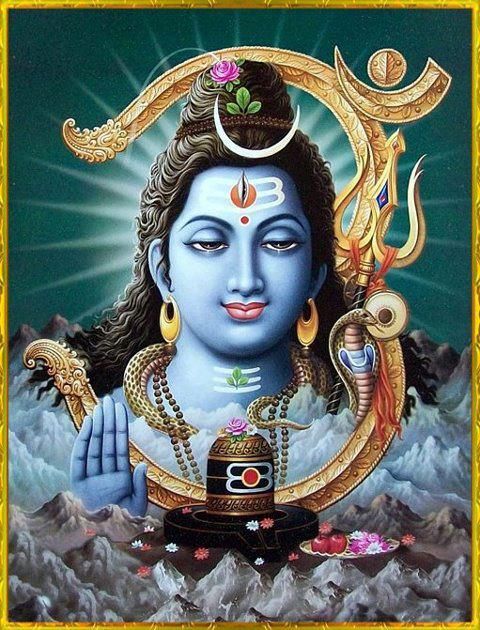
0 Comments
Trackbacks/Pingbacks